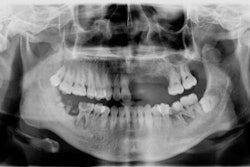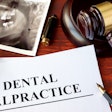
In what appears to be a tragic medical oversight at Cork University Hospital (CUH) in Ireland, a 33-year-old woman from Kanturk died following complications after swallowing her dental plate. Despite an initial x-ray, which did not detect the foreign object, Beata Kunicka was subsequently discharged by CUH staff and later died.
According to an article in the The Irish Times, the High Court heard that CUH has apologized to the woman's family "for the deficiencies in the care."
Kunicka first sought emergency care on September 25, 2023, after experiencing chest pain and suspecting that she had ingested her dental appliance. Although Kanturk was able to eat and drink postexamination, this proved a fatal misjudgment, as the type of denture plate she had was not visible on x-ray imaging.
Seventeen days later, Kunicka reportedly suffered severe bleeding at home and was rushed back to CUH, where delays in treatment exacerbated her condition. Despite surgery to remove the dental plate from her esophagus and efforts at resuscitation following cardiac arrest due to shock, Kunicka did not survive.
Along with the apology, the High Court learned that medical staff were unaware that certain dentures do not show on x-rays. The Health Service Executive did not contest liability for Kunicka's death, with proceedings settled for 450,000 euros ($487,000) through mediation with Kunicka's partner, Kamil Jarzembski.
Judge Leonie Reynolds expressed condolences over these "tragic series of events" while highlighting that recommendations from this case have been circulated nationally in hopes of preventing similar incidents. Experts note that while most swallowed objects pass without issue and are often undetectable on plain radiographs unless they are metallic, this case underscores the importance of thorough examination and consideration beyond standard protocols when a patient's life is at stake.
Editor's note: This article was rewritten after first appearing in our sister publication, AuntMinnieEurope.com.



















